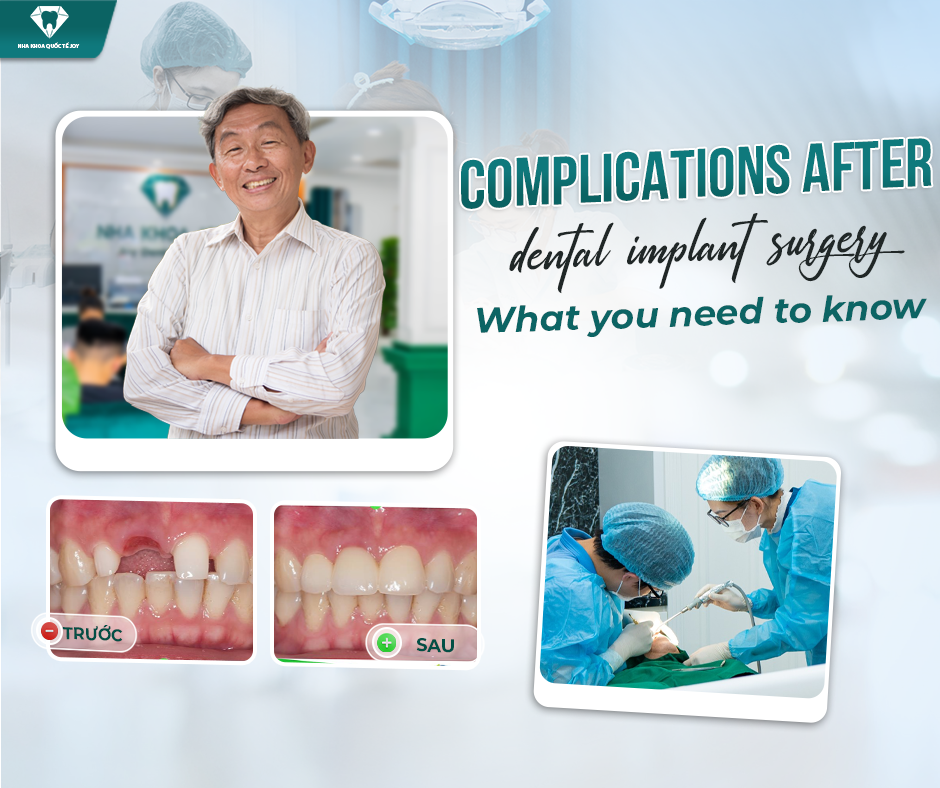It can be said that implant is the most modern and optimal method of tooth restoration today. This method is also widely applied in reputable dental clinics. Although this is a fairly familiar surgery, if the implementation process is guaranteed. Then you can completely encounter dangerous complications after dental implant surgery. Today, let’s learn more about this issue with Joy International Dental Clinic. As well as see more ways to effectively prevent this condition.
1. Is Dental Implant Surgery Safe?
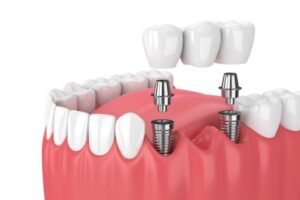
Dental implant surgery is a well-established procedure with a high success rate. When performed by skilled professionals adhering to stringent protocols, it is generally safe and straightforward. However, as with any surgical intervention, there are inherent risks. Understanding these risks is vital for making informed decisions and ensuring optimal outcomes.
2. Potential Complications After Dental Implant Surgery
While complications are relatively rare, being informed about them can aid in early detection and management.
2.1 Complications after dental implant surgery are infections.
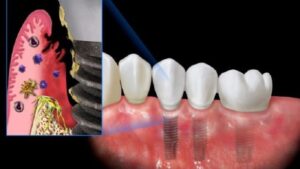
Post-operative infections can occur if the surgical area isn’t maintained properly or if aftercare instructions aren’t followed meticulously. Signs include persistent redness, swelling, pain, foul odor, or discharge from the implant site.Left untreated, infections can extend to the jawbone, jeopardizing the implant’s stability and overall oral health.Maintaining rigorous oral hygiene and adhering to prescribed care routines are paramount in preventing infections.
2.2 Prolonged Bleeding
It’s normal to experience slight bleeding immediately after surgery. However, if bleeding persists beyond 24 hours, it may indicate an underlying issue. Factors contributing to prolonged bleeding include improper blood clot formation, engaging in strenuous activities too soon, or the use of certain medications. Applying gentle pressure with sterile gauze and avoiding activities that elevate blood pressure can help manage this. If bleeding continues, seeking prompt dental evaluation is essential.
2.3 Nerve Damage
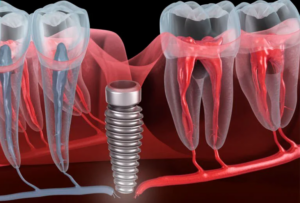
Incorrect implant placement, especially in proximity to the mandibular nerve, can lead to nerve impairment. Symptoms encompass numbness, tingling, or a burning sensation in the lips, tongue, or chin. Such complications underscore the importance of thorough pre-surgical imaging and planning. If any unusual sensations arise post-surgery, contacting your dental professional immediately is crucial.
2.4 Implant Rejection or Failure
Although titanium implants are biocompatible, there’s a slight chance the body might reject them. Indicators include persistent discomfort, swelling, or implant mobility. Factors like poor bone quality, uncontrolled diabetes, or smoking can elevate the risk of implant failure. Regular follow-ups enable early detection and intervention, enhancing the likelihood of success.
2.5 Damage to Adjacent Structures
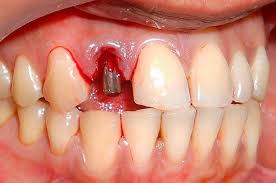
During implant placement, there’s potential for harm to neighboring teeth, blood vessels, or soft tissues if not executed with precision. Such injuries can result in pain, additional treatments, and extended healing periods. Selecting an experienced dental surgeon minimizes these risks and promotes smoother recovery.
2.6 Sinus Complications
For implants in the upper jaw, especially near the sinus cavities, improper placement can lead to sinus perforation. This may cause sinus infections or discomfort. Comprehensive pre-surgical assessments help in identifying anatomical considerations, allowing for adjustments to avoid such issues.
3. Strategies to Minimize Risks and Complications
Proactive measures can significantly reduce the likelihood of post-operative complications.
3.1 Adhering to Proper Oral Hygiene

Maintaining cleanliness around the implant site is crucial. Utilize a soft-bristled toothbrush to gently clean the area, avoiding direct pressure on the surgical site initially. Incorporate antimicrobial mouth rinses as recommended to deter bacterial growth. Regular dental check-ups facilitate professional cleaning and monitoring, ensuring any potential issues are addressed promptly.
3.2 Following a Suitable Diet

Diet plays a pivotal role in the healing trajectory. Initially, consume soft foods like yogurt, mashed potatoes, and smoothies to prevent undue stress on the implant. Steer clear of hard, crunchy, or sticky foods that might disrupt the surgical site. As healing progresses, gradually reintroduce a balanced diet rich in vitamins and minerals to support tissue regeneration and overall well-being.
3.3 Avoiding Tobacco and Excessive Alcohol
Smoking and heavy alcohol consumption can impede healing and increase infection risks. Nicotine constricts blood vessels, reducing blood flow essential for healing. Abstaining from these substances before and after surgery enhances the probability of a successful outcome.
3.4 Managing Underlying Health Conditions
Chronic ailments like diabetes or osteoporosis can affect healing and implant integration. Collaborate with your healthcare providers to ensure these conditions are well-controlled prior to undergoing implant surgery. Transparent communication about your medical history enables tailored treatment planning.
3.5 Attending All Follow-Up Appointments
Scheduled post-operative visits allow your dentist to monitor healing, assess implant stability, and address any concerns promptly. Adhering to these appointments is fundamental for long-term success.
Conclusion
Dental implants are a great step forward in modern dentistry. But to achieve optimal results and minimize complications after dental implant surgery. You need to choose a reputable treatment facility, a highly skilled doctor and follow the post-operative care instructions. If you are looking for a reliable place to perform dental implants. Then Joy International Dental Clinic is the ideal choice. A place committed to bringing you a healthy smile and long-term peace of mind.

